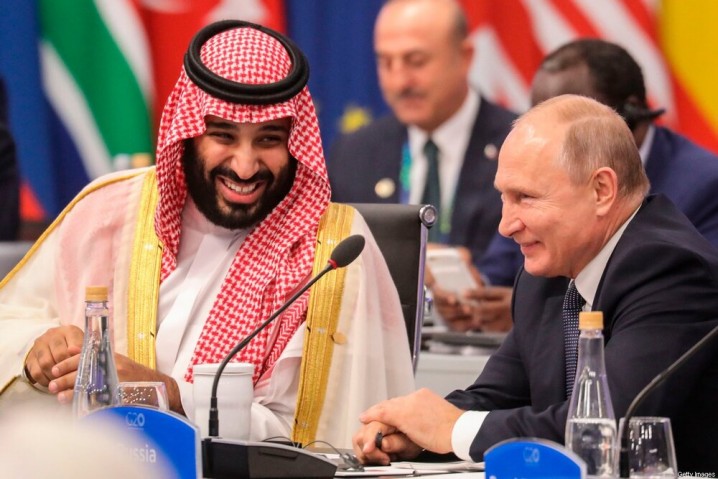Russia, Saudi end oil feud but is it enough?

TEHRAN – The Organization of Petroleum Exporting Countries (OPEC) and their non-OPEC allies, on Thursday, reached a tentative agreement to cut the global oil output by at least 10 million barrels for May and June to balance the oil market which literary doesn’t have any more capacity to store the supplied oil.
Although this is said to be the biggest cut ever agreed on by the world’s oil producers, however, there are still doubts about the effectiveness of the cuts considering the magnitude of the fall in the demand side and the agreement itself is also not completely solid yet.
As the biggest OPEC player, Saudi Arabia is doing all it can to get other nations, especially, the U.S., to join the efforts for balancing the oil market.
Hosted by Saudi Arabia, energy ministers from the G20 are scheduled to gather today discuss the energy markets and the necessary measures for securing the global economy.
But whether Saudi Arabia would succeed in its efforts is still a place of great debate.
Experts and analysts
Energy experts and analysts are divided on their view about the OPEC+ agreement, some believe that a production cut agreement is necessary for stabilization of the market, and in general emphasize the comprehensive cooperation among the oil-producing countries to maximize the impact of such a decision.
The second group, however, believe that the agreement reached among the OPEC+ nations to reduce their production by 10 million bpd is not going to be enough to save the oil market since estimates show that demand for oil will fall between 20 and 35 million barrels per day (about one-third of the 2019’s demand).
They argue that eventually, despite the agreement, millions of barrels of oil will not find customers and will inevitably be stored, pushing the already oversupplied market to tumble deeper.
This group believes that the agreement will only slow down the process of replenishing the global oil reserves and is somehow only buying time. The world's oil reserves are expected to reach their peak in May (next month) if the supply is not reduced accordingly.
Global stance
Like the experts’ views on the effectiveness of the deal, the world nations are also divided regarding their stand on the issue in general.
With their national interests and economies at stake, some countries believe that such an agreement is a must for saving the global oil market, and on the other hand, some developing economies that need lower oil prices are not in the proponents’ side.
As the world’s biggest oil producers U.S. and Saudi Arabia are the major proponents of the agreement. Russia, which had previously opposed any ideas of new cuts and had ended the OPEC+ previous deal, also retreated from its stance after the U.S. pushed for a global supply cut earlier this month but announced that it would cooperate only on the condition that the U.S. also joins the global effort.
Other countries like Norway, Canada, and Brazil have also voiced their support for the agreements along with OPEC nations like Iran, Iraq, Kuwait, Nigeria and the United Arab Emirates (UAE).
As I mentioned before, despite the great support for the agreement, some oil-consuming countries like China, India, and Turkey are quite content with the current oil prices and are not among the supporters of the supply cuts.
Even the UK which is an oil-producing nation is not a big supporter for higher oil prices due to political issues and France is also on the same page with the UK considering the country’s recent political and economic issues.
The U.S.
Being the country that is facing the biggest threat from the collapse in the oil prices, the U.S. seems not to be willing to pay the price for saving its oil industry from falling along.
The U.S. shale producers are all facing bankruptcy since they need $40-$50 oil to be able to profit and operate.
"The numbers are so low that there will be layoffs all over the world, there will be certainly layoffs in this country and we don't want that to happen," Donald Trump said, reacting to the situation.
Trump which was the biggest player in persuading OPEC+ to take action for saving the oil market, now seems not to be willing to share the burden and has risen some red flags.
Since, many other nations like Russia, are eyeing U.S.’s decisions on the matter, any decision on the U.S. side would have a great impact on the future of the current “Declaration of Cooperation” and also on its effectiveness.